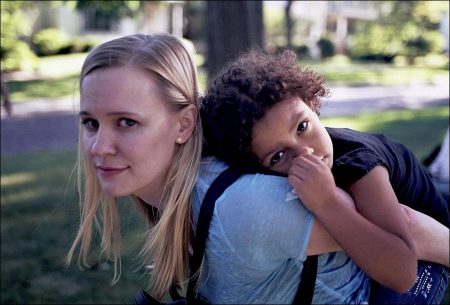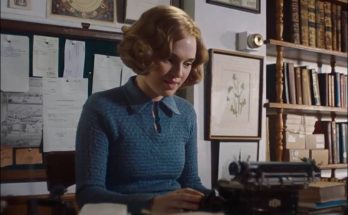Saint Frances Movie Storyline. The termination of an unplanned pregnancy and a job nannying a precocious 6-year-old girl prompt a directionless young woman to recalibrate her notions of family in Alex Thompson’s first feature. “I’m not an impressive person,” says screenwriter and lead actor Kelly O’Sullivan as the emotionally untethered Bridget toward the end of Saint Frances. “I don’t have a husband or kids or a fancy job.”
Those standard markers that define life fulfillment for many women are held up for gently ironic questioning in Alex Thompson’s slender but appealing debut feature. Of note for its nonjudgmental stance on abortion and its normalizing treatment of queer parenting, though not immune to occasional heavy-handedness or caricature, the film has enough modest charms to connect with audiences similarly navigating the bridge between youthful detachment and grounded adulthood.
The funny intro scene swiftly nails Bridget’s insecurities as she listens with increasing discomfort to a random guy at a party recount a nightmare in which, having hit 34 with no significant achievements, he hurls himself out a window. While sheepishly admitting that she is in fact 34 and waiting tables, Bridget makes eye contact with a younger guy, Jace (Max Lipchitz), across the room. She latches onto him like a life raft, grateful to learn that he’s a fellow server unlikely to add to her sense of inadequacy.
The unexpected arrival of her period during sex yields a major mess the next morning, but in a moment that flips the received gender norms and is echoed elsewhere in the movie, 26-year-old Jace is revealed to be a paragon of sweet sensitivity, taking the bloodbath in stride as he helps Bridget clean up her bedding.
A Northwestern creative-writing dropout, Bridget attempts to escape her diner job by applying to work as a nanny for a mixed-race lesbian couple in the affluent Chicago suburbs. Their proudly liberal sensibilities are advertised with a “Hate Has No Home Here” sticker on the front door and a “Black Lives Matter” sign on the lawn. But her candid ambivalence about kids and failure to make an impression on their opinionated 6-year-old daughter Frances (Ramona Edith-Williams) — “We’re done,” says the girl, abruptly ending their exploratory first meeting — mean she only gets the job months later as a fallback choice after a more experienced childcare worker has bombed.
Meanwhile, Jace has become a regular part of Bridget’s life, even if she’s reluctant to call what they have a relationship. Faced with an unplanned pregnancy, she doesn’t hesitate in choosing an abortion, resisting Jace’s tentative efforts to talk through other options.
The chief narrative engine is the evolving friendship between Bridget and Frances, who constantly tries to outsmart and manipulate the inexperienced nanny in their early excursions together to the park or library. But the willful brat slowly comes around to feel affection and maybe even admiration for Bridget. Just as Bridget is feeling like a failure for not having figured out what to do with her life, this clever, curious, intuitive kid, who has grown up in a feminist household exposed to adult concepts from a young age, quietly boosts the older woman’s self-worth and improves her attitude toward future possibilities.
Some of this borders on formulaic, but while O’Sullivan’s performance is a tad muted in the central role, Edith-Williams is such a disarmingly natural screen presence that she keeps it fresh. And O’Sullivan’s script camouflages the familiar aspects with the more soulful interactions between Bridget and one of Frances’ mothers, Maya, played by Charin Alvarez in the film’s standout performance. While her wife Annie (Lily Mojekwu) works long hours in a demanding job, Maya is adrift, dealing with postpartum depression following the birth of Frances’ baby brother. That thread enriches the story with melancholy notes that dovetail nicely with Bridget’s introspective moments.
While the abortion is treated matter-of-factly, without a trace of melodrama, Bridget deals with physical after-effects for many weeks. Jace, by contrast, keeps an “emotions journal” full of unprocessed feelings that he tries to get her to discuss. This gives rise to an amusing joke about millennials having too many feelings, while Bridget excludes herself by clarifying, “I’m on the cusp.” A part of the character’s growth is her eventual willingness to open up, a shift influenced by the renewed closeness of Maya and Annie, making Saint Frances a belated coming-of-age story.
The delicacy of those core elements is not always matched by O’Sullivan’s writing of the peripheral characters. A single scene with Bridget’s parents (Chicago theater vets Mary Beth Fisher and Francis Guinan) adds little, and a quasi-romance with a hippie-dippy guitarist (Jim True-Frost) from Frances’ artsy daycare center, even less.
It’s no doubt true that pockets of conservative intolerance exist in Chicago’s well-heeled ‘burbs, but an indignant woman at the park (Rebecca Spence), bristling about Maya breast-feeding in public, feels more like a device than a real person. Likewise, a neighbor of Maya and Annie’s (Rebekah Ward), who remembers Bridget from Northwestern and starts treating her like the help as soon as she registers the situation. The woman is such a toxic asshole — she wrote a motivational book called Resting Rich Face and has an “Unborn Lives Matter” sticker on her refrigerator — that you question whether their kids’ playdates would be enough to sustain even a superficial friendship with the lesbians next door.
But Thompson’s direction and O’Sullivan’s screenplay are more often characterized by their light touch than their missteps in a likeable film elevated by its crisp, summery look and warm score.
Saint Frances (2020)
Directed by: Alex Thompson
Starring: Kelly O’Sullivan, Charin Alvarez, Braden Crothers, Laura T. Fisher, Mary Beth Fisher, Meighan Gerachis, Francis Guinan, Lily Mojekwu, Bradley Grant Smith, Rebekah Ward, Jim True-Frost
Screenplay by: Kelly O’Sullivan
Production Design by: Maggie O’Brien
Cinematography by: Nate Hurtsellers
Music by: Alex Babbitt, Quinn Tsan
MPAA Rating: None.
Distributed by: Oscilloscope
Release Date: February 28, 2020
Views: 32




